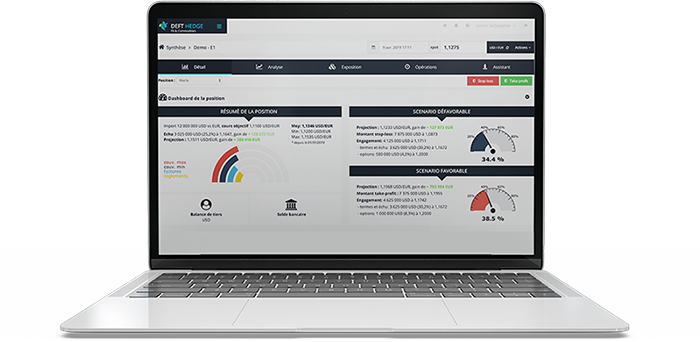Accounting and exchange rates.

In order for your accounting to comply with the rules in force, you must take into account all the specificities related to your operations. Among them, the recording of transactions impacted by an exchange rate is subject to specific processing. Indeed, carrying out international transactions involves certain risks related to exchange rate fluctuations.
In your accounting, it is necessary to take into account exchange rate gains and losses. These exchange rate risks can have a more or less significant impact on your profitability and therefore force companies to anticipate exchange rate fluctuations as much as possible.
In order to help you record your transactions and protect yourself against exchange rate risks, DeftHedge now offers a SaaS solution that enables companies to adapt their international purchasing and sales strategy as effectively as possible.
Very simple to use, our application will become indispensable on a daily basis to guide and manage your commercial strategy. DeftHedge is therefore the ideal ally to support companies and protect them against exchange rate risks.
In order to fully understand the effects of exchange rate fluctuations, we go back in detail to the accounting of foreign exchange losses and gains.
What is an exchange rate gain?
In the event that the evolution of the price of one currency in relation to another is favourable to the selling company, the transaction carried out will represent what is known as an exchange gain. The foreign exchange gain therefore arises when a foreign currency transaction is settled at a higher rate than that previously recorded in the accounts.
The profits related to foreign exchange gains will then be reflected in the company’s income statement.
How to calculate a foreign exchange gain or loss?
Exchange gains or losses are calculated at the end of each accounting period. The amount of the exchange gain or loss must be estimated by recalculating the monetary item at the exchange rate prevailing at the balance sheet date.
The resulting difference between the translation and the accounting will then have to be recognised as an exchange loss or gain depending on the situation.
Since 1 January 2017, exchange gains and losses must be itemised and recorded in different accounts depending on the situation:
- Account 656: Exchange losses on trade receivables and payables
- Account 666: Exchange losses on receivables and payables
- Account 756: Exchange gains on trade receivables and payables
- Account 766: Exchange gains on financial receivables and debts
From now on, exchange gains and losses will be clearly shown in the operating accounts of companies.


How to account for the exchange rate ?
If you do a lot of business abroad, you may need to open a bank account in the currency of the country with which you are doing business. This makes it easier to record all your transactions in foreign currency, which will then be converted into euros at least once a year at the end of the financial year.
You should be aware that it is also possible to record foreign currency transactions in a French account. Transactions will be recorded in a currency unit other than the euro. Special attention will be paid to these transactions, which will be treated in separate accounts from those of the company. The value of the various transactions recorded will depend on currency fluctuations, which are valued as follows:
For listed currencies: according to the indicative rates of the Banque de France published in the Official Journal.
For other currencies: according to the average monthly rates defined by the Banque de France.
Depending on the operations carried out, the exchange rate to be used will be different:
Rate on the day of the operation
Share price on the last day of the financial year
Average monthly price published in the Official Journal
The recording of transactions that depend on currency fluctuations
To simplify your international transactions, you can therefore have a foreign currency account. There are no special provisions for maintaining this type of account, except for the obligation to convert the sums recorded in foreign currency on the closing date. This provision is imposed by Article 420-7 of the General Chart of Accounts.
This measure thus enables companies to keep accounts in foreign currencies during their accounting period. Companies can therefore convert their operations in different ways:
Immediate conversion: according to the rate of the day of the operation or according to the fixed or average rate.
Conversion at the end of the financial year: via liaison accounts that enable currencies to be linked.
What is a foreign currency translation liability or asset?
A currency translation difference, liability or asset, arises when receivables and payables in foreign currencies are converted into euros. This conversion is based on the last exchange rate in force on the closing date of the financial year. Fluctuations in exchange rates will thus create asset or liability translation differences:
The asset translation difference: corresponds to an unrealised loss reflecting a decrease in receivables and an increase in liabilities.
The translation difference on the liabilities side: corresponds to an unrealised gain reflecting a decrease in debts and an increase in receivables.
Translation differences therefore appear at the end of the financial year, when the amount of receivables and payables is different from the amount shown in the accounts.
How do I book a foreign currency bank account ?
The possibility of having a bank account in foreign currency allows companies to facilitate the management of their international operations. The accounting for this type of account is currently governed by two articles of the General Chart of Accounts.
Article 911-1 of the PCG
“The accounts shall be kept in the national currency and language.
A transaction denominated in a currency other than the national currency may be recorded without being converted if the nature of the transaction and the activity of the entity justify it. In this case, only the balance of the account recording such transactions shall be converted into national currency at the balance sheet date.”.
Article 420-7 of the PCG
“Cash or immediate foreign currency liabilities existing at the close of the financial year are converted into national currency on the basis of the last spot exchange rate.
Translation differences are recognised in the income statement for the financial year, except where the provisions relating to hedging transactions are applied”.
What is the purpose of the bill of exchange for accounting purposes?
The bill of exchange is a document particularly used for international transactions between professionals. This document represents a contract in which the supplier mentions the client’s obligation to pay a certain sum, according to a deadline agreed between the two parties. The bill of exchange is brought to the attention of the supplier’s bank, which certifies the claim and the terms of payment. The issue of a bill of exchange is particularly important in the case of foreign currency transactions.
Facilitate your exchange rate accounting with DeftHedge
On a daily basis, keeping your company’s accounts is therefore essential. If you carry out international transactions, you will need to have a specific follow-up and anticipate as well as possible the various risks involved in foreign currency transactions. In order to help you in your strategy, you can therefore use our SaaS solution and its numerous functionalities.
DeftHedge helps you to improve your currency management and becomes a real tool to define and guide your investment strategy.
The functionalities of DeftHedge allow you to automate many accounting tasks and to create efficient financial strategies. With our tool, you will thus effectively reduce the various exchange rate risks and optimise your financial gains. DeftHedge supports you at many levels in your strategy and in your trading on the international market.
Thanks to our solution designed for professionals, you will save precious time on a daily basis and considerably reduce exchange rate risks.
